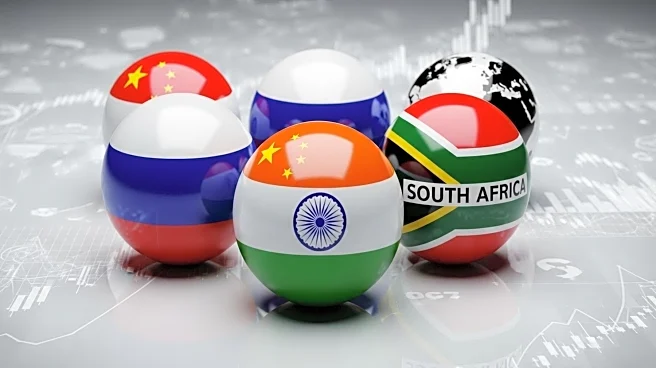What's Happening?
President Trump has imposed higher tariffs on BRICS nations, which include Brazil, Russia, India, China, and South Africa, than on other countries. This action has inadvertently drawn these emerging economies closer together, fostering a shared grievance and prompting them to expand bilateral trade agreements in national currencies to reduce dependence on the US dollar. The tariffs have also led BRICS central banks to increase gold purchases, signaling a desire to dedollarize. The upcoming Shanghai Cooperation Organization summit in Tianjin will see Chinese President Xi Jinping host Indian and Russian leaders, marking a significant step in strengthening BRICS ties. The summit aims to revive trilateral talks among China, Russia, and India, potentially easing tensions and presenting a unified counterbalance to Western influence.
Why It's Important?
The strengthening of BRICS ties due to President Trump's tariffs could have significant implications for global economic dynamics. By fostering closer cooperation among these nations, the tariffs may diminish US influence and encourage BRICS members to pursue alternative economic strategies, such as dedollarization. This shift could impact US trade relations and economic policies, as BRICS nations seek to reduce reliance on the US dollar and explore new trade agreements. Additionally, the growing solidarity among BRICS members may challenge US global dominance, prompting changes in international trade and finance systems. The realignment of economic alliances could affect US industries and stakeholders, particularly those involved in international trade and finance.
What's Next?
The Shanghai Cooperation Organization summit in Tianjin is expected to further solidify BRICS cooperation, with potential trilateral talks among China, Russia, and India. These discussions could lead to increased economic collaboration and a more cohesive BRICS alliance. India, despite its longstanding ties with Washington, is recalibrating its approach to China, resuming direct flights and easing visa restrictions. This shift may lead to increased trade and economic ties between India and China, although historical grievances remain. The summit may also see discussions on a single BRICS currency, although this proposal is currently on hold. The future of BRICS cooperation will likely focus on pragmatic trade, finance, and supply chain collaboration.
Beyond the Headlines
The deeper implications of President Trump's tariffs on BRICS nations include potential shifts in global governance and economic systems. As BRICS nations explore alternative trade and financial strategies, there may be long-term changes in international economic structures. The move towards dedollarization and increased intra-BRICS trade could lead to a more fragmented global economy, with diverging national interests within BRICS potentially limiting its ambitions. However, the pragmatic cooperation among BRICS members may foster new trade initiatives and investment opportunities, gradually chipping away at the US dollar's dominance without dethroning it entirely.










